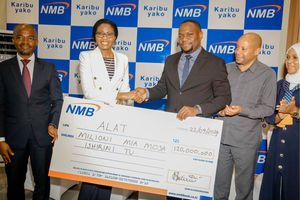Lack of quality toilets a drawback for TZ stadia

Dar es Salaam. Football is the number one spectator sport in Tanzania, with almost every street in metropolises boasting a team of its own!
Matches involving these teams attract relatively huge attendances; yet, some of the facilities found in these grounds do not meet the required hygienic standards.
Spectators have mostly to make do with the sorry state of the few available facilities during soccer tournaments, including the Ndondo Cup, which has become quite a crowd puller.
However, all this is about to change for the better – what with an ongoing campaign dubbed ‘Usichukulie Poa’ (Don’t take it casually) that targets improved quality toilets for use across the country.
For starters, the campaign targets improving toilets in the two football stadiums of ‘Kinesi’ and ‘Bandari’ in Dar es Salaam, which are currently hosting the Ndondo Cup. The general idea is to show stakeholders what the envisaged improvement could mean to spectators who come to the stadiums.
Kinesi Stadium, which is located within the Ubungo municipal council, hosted Tottenham Hotspurs’ midfielder Victor Wanyama at one of their games last year. If nothing else, this further illustrates the need to improve the stadium’s amenities.
Organisers say these stadiums have been selected as part of the improvement initiative because they represent the sad state of toilets in most football grounds in Tanzania.
“Many of these grounds do not have quality toilets – and even the ones that are in place are rarely cleaned. Yet, thousands of people throng these venues to watch popular sports such as soccer,” says Apolinary Macha, the campaign’s project manager.
He adds: “because we are part of the Ndondo Cup tournament, it would be quite unbecoming for us to associate ourselves with venues that do not have quality toilets.”
The toilets – according to the project manager – do not mirror this popular game and the thousands of fans who regularly come to the grounds in search of this decidedly entertaining spectator sport.
“As part of the initiative’s contribution, we have decided to upgrade the toilets in these grounds – something that we believe will please the fans who go there to watch the game,” Mr Macha says.
But, as the campaign gets under way, the relevant authorities believe that there is still a long, long way to go to achieve the ambitious goal of ending urinating openly, and ensuring that every Tanzanian uses an improved toilet – and washes hands with soap thereafter.
The state of the toilets in the stadiums mirrors the general picture of toilet use in Tanzania as a whole – which is not satisfactory.
Statistics show that the availability of improved toilets in Tanzania remains low, with many homes and public places lacking proper toilets – thus adding to the health and sanitation hazards that the situation poses to communities.
To-date, five-in-10 Tanzanians continue to use unsanitary latrines – the majority being simple pits that are not easy to keep clean.
While these may provide limited privacy, they nonetheless do not break the transmission chain of germs that cause assorted serious illnesses such as diarrhea.
It is also estimated that about 5 million Tanzanians do not use a latrine at all, and indulge in open defecation – which further complicates the entire process. Findings of the National Bureau of Statistics(NBS) in 2016 put the number between 16-and-19 per cent as those who have access to quality toilets in Tanzania, while only some 15-to-30 per cent use soap to wash their hands after easing themselves in terms of calls of nature!
According to the improved toilets’ project manager, Apolinary Macha, the ‘Usiichukulie Poa’ campaign builds upon ongoing efforts that address the sanitation and hygiene-related issues in Tanzania through the ‘Mtu ni Afya’ campaign and the National Sanitation Campaign (Phase-1) that were implemented between 2012 and 2016.
Now in its second phase (2017-2021), the initiative targets behavioral change towards use of improved toilets in homesteads.
The initiative targets members of the general public to make them appreciate that, for a human being’s life and home to be complete, he needs a quality toilet – as opposed to the mindset that things like motor cars, houses, smart phones and fancy dressing are part of modernity.
Campaign Phase 1 that was implemented between 2012 and 2016.
Now in its second phase (2017 – 2021), the initiative targets behavioral change towards use of improving toilets in homesteads.
The initiative, therefore, targets the general public to make them appreciate that for a human being’s life and home to be complete he needs a quality toilet, as opposed to the mindset that certain things such as cars, houses, smart phones and dressing as part of modernity.




